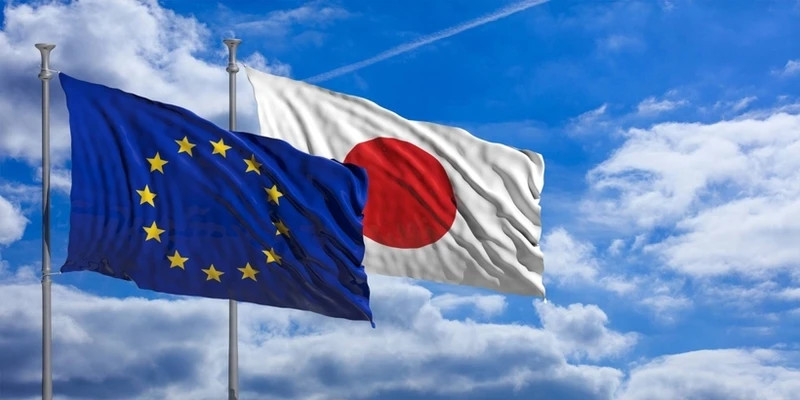This is the first framework agreement between the two sides, guiding closer political, economic, international and regional ties, creating momentum to further promote Japan-EU cooperation, on a series of important issues.
The SPA was signed by the EU and Japan in Tokyo in July 2018 and approved by the European Parliament in December 2018. In April last year, the ratification procedures of the member states were completed and the agreement officially entered into force at the beginning of this year. The agreement aims to lay the foundation for future cooperation between Japan and the EU.
The agreement provides a broad framework for formalising cooperation in a range of areas, including trade, climate change, energy and human rights.
While the two structurally similar advanced economies will struggle to reap the huge benefits from trade, bilateral trade and investment flows have increased significantly. Non-tariff barriers remain a hindrance but are expected to fade as the two economies become more closely linked.
Over the past 20 years, the EU-Japan relationship has been marked by a remarkable level of mutual understanding, with economic cooperation dominating. In 2022, Japan was the EU’s second-largest trading partner in Asia, after China, and its seventh-largest trading partner globally.
That same year, Japan’s imports to the EU reached almost €70 billion, while EU exports in the opposite direction amounted to more than €71.6 billion.
The SPA opens up new trade opportunities for both sides protecting common values such as democracy, the rule of law and human rights.
The SPA opens up new trade opportunities for both sides, protecting common values such as democracy, the rule of law and human rights. Bilaterally, the SPA creates new momentum for cooperation in security, counter-terrorism, international crime and preventing the proliferation of weapons of mass destruction.
The agreement expands cooperation in areas such as space, information and communications technology, industrial policy, energy, transport, education, research and innovation.
In addition, the SPA focuses on building a transparent, fair and open economic environment for international cooperation. The agreement affirms the EU and Japan’s commitment to strengthening the multilateral system and promoting a rules-based world order.
Along with the SPA, the Economic Partnership Agreement (EPA) - another bilateral agreement - was also adopted after being approved by the EU Council. The two sides adopted the Japan-EU Economic Partnership Agreement, which removes most existing tariffs between the two economies.
Japan and the EU also identified common threats in cyber security, natural disasters, terrorism, proliferation of weapons of mass destruction and maritime security. To jointly maintain the rules-based international order, the two agreements have established a framework for the two sides to strengthen political, security and development cooperation based on liberal values.
However, in the context of the current complex world situation, with intertwined interests and conflicts, the strategic partnership between the EU and Japan also faces many challenges. One of the future challenges may be the conflict of economic interests and national security.
A series of security issues may harm the economic interests of both sides. In such a situation, careful coordination and mutual respect are considered the key to ensuring effective cooperation between Japan and the EU.
A joint committee will be established to coordinate and monitor the entire partnership, serving as a forum for discussing and handling issues arising within the scope of the SPA. In particular, a dispute settlement mechanism is established to ensure the smooth implementation of the agreement.
The SPA is a testament to the comprehensive and deep cooperation between the EU and Japan. The SPA is not only a milestone affirming the sustainable cooperation between the two sides, but also a foundation for the EU and Japan to jointly respond to global challenges.
This agreement lays the foundation for a prosperous future, in the context of the EU and Japan playing a key role in promoting peace, stability and sustainable development in the world.
With the strategic vision and practical benefits that the SPA brings, the EU-Japan partnership is expected to continue to develop strongly, towards a new era of comprehensive and effective cooperation.
















